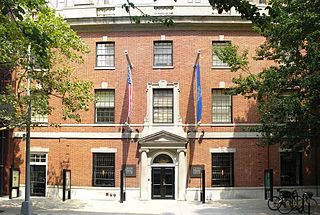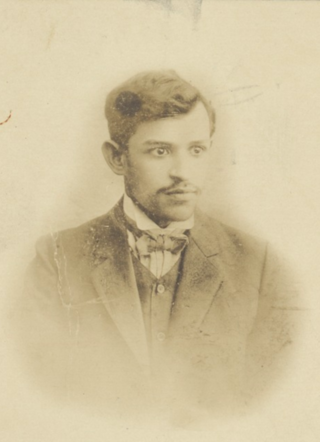Related Research Articles

Yiddish is a West Germanic language historically spoken by Ashkenazi Jews. It originates from 9th century Central Europe, providing the nascent Ashkenazi community with a vernacular based on High German fused with many elements taken from Hebrew and to some extent Aramaic. Most varieties of Yiddish include elements of Slavic languages and the vocabulary contains traces of Romance languages. Yiddish is primarily written in the Hebrew alphabet.
Yiddishism is a cultural and linguistic movement which began among Jews in Eastern Europe during the latter part of the 19th century. Some of the leading founders of this movement were Mendele Moykher-Sforim (1836–1917), I. L. Peretz (1852–1915), and Sholem Aleichem (1859–1916).
Max Weinreich was a Russian-American-Jewish linguist, specializing in sociolinguistics and Yiddish, and the father of the linguist Uriel Weinreich, who edited the Modern Yiddish-English English-Yiddish Dictionary.

YIVO is an organization that preserves, studies, and teaches the cultural history of Jewish life throughout Eastern Europe, Germany, and Russia as well as orthography, lexicography, and other studies related to Yiddish. Established in 1925 in Wilno in the Second Polish Republic as the Yidisher Visnshaftlekher Institut (Yiddish: ייִדישער װיסנשאַפֿטלעכער אינסטיטוט, pronounced [ˈjidiʃɛr ˈvisn.ʃaftlɛχɛr instiˈtut], Yiddish Scientific Institute, its English name became Institute for Jewish Research after its relocation to New York City, but it is still known mainly by its Yiddish acronym. YIVO is now a partner of the Center for Jewish History. Formerly, they had linguists whose main occupation was deciding on grammar rules and new words, and during this time they were seen in the secular world to serve as the recognized language regulator of the Yiddish language. However, YIVO no longer serves this purpose. Nevertheless, the YIVO system is still commonly taught in universities and known as klal shprakh and sometimes "YIVO Yiddish".

Galician Jews or Galitzianers are members of the subgroup of Ashkenazi Jews originating in the Levant having developed in the diaspora of the Kingdom of Galicia and Lodomeria, from contemporary western Ukraine and from south-eastern Poland. Galicia proper, which was inhabited by Ruthenians, Poles and Jews, became a royal province within Austria-Hungary after the Partitions of Poland in the late 18th century. Galician Jews primarily spoke Yiddish.

Joshua Fishman was an American linguist who specialized in the sociology of language, language planning, bilingual education, and language and ethnicity.

Nohum Shtif, was a Jewish linguist, literary historian, publisher, translator, and philologist of the Yiddish language and social activist. In his early years he wrote under the pen name Baal Dimion.
Elias Tcherikower, also known as Eliahu Tcherikover, Elye Tsherikover, Eliahu Tcherikower, Elias Tscherikower, and I. M. Cherikover, was a Russian-born Jewish historian of Judaism or the Jewish people.

Moshe Shalit was a researcher, journalist, essayist, ethnographer, and humanist of the inter-war period.

Noach (Nojach) Pryłucki or Noach Prilutski was a Jewish Polish politician from the Folkspartei. He was also a Yiddish linguist, philologist, lawyer and scholar of considerable renown. Pryłucki was a respected attorney and was said to have had "leadership over the scattered (non-Zionist) national clubs, societies, and groups".
Eleanor Chana Mlotek was a musicologist, specializing in Yiddish folklore. Isaac Bashevis Singer, the Yiddish writer and Nobel laureate, once called Mlotek and her husband, Joseph, “the Sherlock Holmeses of Yiddish folk songs.” She was also inducted in Hunter College's Hall of Fame.
Jakob Lestschinsky was a Jewish statistician and sociologist who wrote in Yiddish, German, and English. He specialized in Jewish demography and economic history. And during the February Revolution in Russia he helped found the United Jewish Socialist Party and served on the editorial board of Naye Tsayt, its official journal.And in 1938 he went to the United States. During the war he lived in New York, and worked with the Institute of Jewish Affairs of the World Jewish Congress.
Abraham Golomb was a Yiddishist teacher and writer. He wrote many pedagogical articles and books, and also published, primarily in Yiddish, about his belief in the need for retaining Jewish distinctiveness in the Diaspora and the centrality of Hebrew and Yiddish as the languages of the Jewish people. His work has not been widely translated into English.
Judah Leib Cahan, more commonly known as Y.L. Cahan, was a Yiddish folklorist.
Camp Boiberik was a Yiddish cultural summer camp founded by Leibush Lehrer in 1913. In 1923 the camp purchased property in Rhinebeck, New York where it would remain until closing in 1979.
Menachem Kipnis, was a singer, critic, and photographer. He was also an ethnographer of Yiddish songs. As a tenor, Kipnis was a common performer of Yiddish songs. He died from a stroke in 1942.
Eliyahu "Elye" Spivak was a Soviet Jewish linguist, philologist, and pedagogue.

Jacob Dinezon, also known as Yankev Dinezon, was a Yiddish author and editor from Lithuania. There are various spellings of Dinezon's name in both Yiddish and English transliteration. Early in his career, Yiddish publications spelled his name דינעזאהן (Dinezohn). Later publications removed the ה and spelled his name דינעזאן or דינעזאָן (Dinezon). In English, his name has been spelled Dienesohn, Dinesen, Dineson, Dinezon, Dinesohn, Dineszohn, Dinezohn, Dynesohn, and Dynezon.
Ruth Rubin was a Canadian-American folklorist, singer, poet, and scholar of Yiddish culture and music.

Israel Wachser was a Russian writer of Yiddish and Hebrew short stories and children's literature.
References
- ↑ Marcus, Jacob Rader; Daniels, Judith M., Concise Dictionary of American Jewish Biography, p. 364
- ↑ Morris Norman Kertzer (1967). Today's American Jew. McGraw-Hill. p. 196. Retrieved 29 January 2013.
- ↑ Robert R. Mathisen (2006). Critical Issues in American Religious History. Baylor University Press. pp. 621–. ISBN 978-1-932792-39-3 . Retrieved 29 January 2013.
- ↑ "In Memoriam Leibush Lehrer". Journal of Jewish Education. 35 (3): 132–134. 1965. doi:10.1080/0021642650350302. ISSN 1524-4113.
- ↑ "Leibush L. Lehrer. Prominent Jewish Educator, Dies in New York; Was 77". JTA. September 18, 1964. Retrieved 17 April 2016.
- ↑ James R. Dow (1994). The Nazification of an Academic Discipline: Folklore in the Third Reich. Indiana University Press. pp. 72–. ISBN 978-0-253-31821-3 . Retrieved 29 January 2013.
- ↑ Cecile Esther Kuznitz (2010). "YIVO". YIVO Encyclopedia of Jews in Eastern European. Retrieved 29 January 2013.
- ↑ Frakes, Jerold C. (2007), "Lehrer, Leibush", Encyclopaedia Judaica, 12: 617, retrieved 2013-02-06
- ↑ Krasner, Jonathan B. (2011). "Passionate Pioneers: The Story of Yiddish Secular Education in North America, 1910–1960 (review)". American Jewish History. 96 (3): 225–227. doi:10.1353/ajh.2011.0000. ISSN 1086-3141. S2CID 161869467.
- ↑ Isidore David Passow; Samuel Tobias Lachs (1972). Gratz College Annual of Jewish Studies. Gratz College. p. 113. Retrieved 29 January 2013.
- ↑ Dawidowicz, Lucy (1989). From That Place And Time: A Memoir, 1938-1947. New York: W.W. Norton. ISBN 0-393-02674-4.